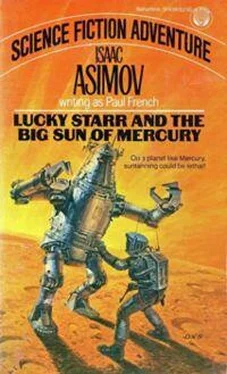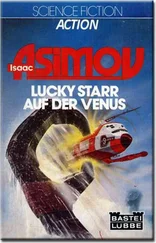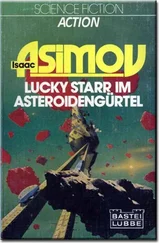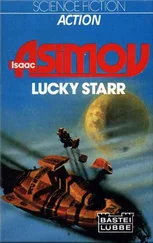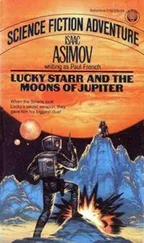Isaac Asimov - Lucky Starr And The Big Sun Of Mercury
Здесь есть возможность читать онлайн «Isaac Asimov - Lucky Starr And The Big Sun Of Mercury» весь текст электронной книги совершенно бесплатно (целиком полную версию без сокращений). В некоторых случаях можно слушать аудио, скачать через торрент в формате fb2 и присутствует краткое содержание. Год выпуска: 1984, ISBN: 1984, Издательство: Ballantine Books, Жанр: Фантастика и фэнтези, на английском языке. Описание произведения, (предисловие) а так же отзывы посетителей доступны на портале библиотеки ЛибКат.
- Название:Lucky Starr And The Big Sun Of Mercury
- Автор:
- Издательство:Ballantine Books
- Жанр:
- Год:1984
- ISBN:ISBN 0-345-31439-5
- Рейтинг книги:4 / 5. Голосов: 1
-
Избранное:Добавить в избранное
- Отзывы:
-
Ваша оценка:
- 80
- 1
- 2
- 3
- 4
- 5
Lucky Starr And The Big Sun Of Mercury: краткое содержание, описание и аннотация
Предлагаем к чтению аннотацию, описание, краткое содержание или предисловие (зависит от того, что написал сам автор книги «Lucky Starr And The Big Sun Of Mercury»). Если вы не нашли необходимую информацию о книге — напишите в комментариях, мы постараемся отыскать её.
Lucky Starr And The Big Sun Of Mercury — читать онлайн бесплатно полную книгу (весь текст) целиком
Ниже представлен текст книги, разбитый по страницам. Система сохранения места последней прочитанной страницы, позволяет с удобством читать онлайн бесплатно книгу «Lucky Starr And The Big Sun Of Mercury», без необходимости каждый раз заново искать на чём Вы остановились. Поставьте закладку, и сможете в любой момент перейти на страницу, на которой закончили чтение.
Интервал:
Закладка:
New planets too. Venus and Earth ought both to have risen above the horizon in the interval.
And there they were. Venus was the higher of the two, a diamond-bright bit of white light, much more brilliant than it ever appeared to be on Earth. From Earth, Venus was seen at a disadvantage. It was between Earth and the Sun, so that when Venus was closest, Earth could see only its dark side. On Mercury, Venus could be seen at the full.
At the moment, Venus was thirty-three million miles from Mercury. At the closest, however, it could approach to within almost twenty million miles, and then keen eyes could actually see it as a tiny disk.
Even as it was, its light almost rivaled that of the corona, and, staring at the ground, Lucky thought he could make out a double shadow extending from his feet, one cast by the corona (a fuzzy one) and one by Venus (a sharp one). He wondered if, under ideal circumstances, there might not be a triple shadow, the third being cast by Earth itself.
He found Earth, too, without difficulty. It was quite near the horizon, and, though it was brighter than any star or planet in its own skies, it was pale in comparison to the glorious Venus. It was less brightly lit by its more distant Sun; it was less cloudy and therefore reflected less of the light it did give. Furthermore, it was twice as far from Mercury as Venus was.
Yet in one respect it was incomparably more interesting. Where Venus's light was a pure white, Earth's light was a blue-green glow.
And more than that, there was near it, just skirting the horizon, the smaller yellow light of Earth's Moon. Together, Earth and Moon made a unique sight in the skies of the other planets inside the orbit of Jupiter. A double planet, traveling majestically across the skies in each other's company, the smaller circling the larger in a motion which, against the sky, looked like a slow wobble from side to side.
Lucky stared at the sight perhaps longer than he should have, yet he could not help it. The conditions of his life took him far from his home planet on occasion, and that made it all the dearer to him. All the quadrillions of human beings throughout the Galaxy had originated on Earth. Through almost all of man's history, Earth had been his only home, in fact. What man could look on Earth's speck of light without emotion?
Lucky tore his eyes away, shaking his head. There was work to be done.
He set out with firm stride toward the coronal glow, skimming close to the surface as was proper in low gravity, keeping his suit-light on and his gaze fixed at the ground before him in order to guard against its rough unevenness.
He had an idea of what he might find, but it was purely a notion, backed as yet by no definite fact. Lucky had a horror of discussing such notions, which were sometimes nothing more than intuitions. He even disliked lingering on them in his own mind. There was too great a danger of growing used to the idea, of beginning to depend upon it as truth, of closing the mind unintentionally to alternate possibilities.
He had seen this happen to the ebullient, ready-to-believe, ready-to-act Bigman. He had watched vague possibilities become firm convictions in Bigman's mind more than once…
He smiled gently at the thought of the little bantam. Injudicious he might be, levelheaded never, but he was loyal and ablaze with fearlessness. Lucky would rather have Bigman at his side than a fleet of armored space-cruisers manned by giants.
He missed the gnome-faced Martian now, as he leaped flatly along the Mercurian terrain, and it was partly to wipe out that uncomfortable sensation that Lucky returned to thoughts of the problem at hand.
The trouble was that there were so many crosscurrents.
First, there was Mindes himself, nervous, unstable, unsure of himself. It had never been entirely settled, really, how far his attack on Lucky had been momentary madness and how far settled calculation. There was Gardoma, who was Mindes's friend. Was he a dedicated idealist caught up in the dream of Project Light, or was he with Mindes for purely practical reasons? If so, what were they?
Urteil, himself, was a main focus of disturbance. He was intent on ruining the Council, and the object of his main attack was Mindes. Yet his arrogance naturally spread hate of himself wherever he went. Mindes hated him, of course, and so did Gardoma. Dr. Peverale hated him in a much more restrained fashion. He would not even discuss the man with Lucky.
At the banquet, Cook had seemed to shrink from talking to Urteil, never let his eyes as much as move in his direction. Was this simply because Cook was anxious to avoid the sharp, flailing edge of Urteil's tongue, or were there more specific reasons?
Cook thought little of Peverale too. He was ashamed of the old man's preoccupation with Sirius.
And there was one question that remained to be answered aside from all these things. Who had slashed Lucky's inso-suit?
There were too many factors. Lucky had a line of thought that threaded through them, but as yet that line was weak. Again he avoided concentrating on that line. He must retain an open mind.
The ground was sloping upward and he had adjusted his stride to suit it automatically. So preoccupied was he with his thoughts that the sight that caught his eyes as he topped that rise found him unprepared and struck him with amazement.
The extreme upper edge of the Sun was above the broken horizon, yet not the Sun itself. Only the prominences that edged the Sun showed, a small segment of them.
The prominences were brilliant red in color, and one, in the very center of those visible, was made up of blazing streamers moving upward and outward with inching slowness.
Sharp and bright against the rock of Mercury, un-dimmed by atmosphere, unhazed by dust, it was a sight of incredible beauty. The tongue of flame seemed to be growing out of Mercury's dark crust as though the planet's horizon were on fire or a volcano of more than giant size had suddenly erupted and been trapped in mid-blaze.
Yet those prominences were incomparably more than anything that could have appeared on Mercury. The one he watched, Lucky knew, was large enough to swallow a hundred Earths whole, or five thousand Mercuries. And there it burned in atomic fire, lighting up Lucky and all his surroundings.
He turned off his suit-light to see.
Those surfaces of the rocks that faced directly toward the prominences were awash with ruddy light, all other surfaces were black as coal. It was as though someone had painted a bottomless pit with streaks of red. Truly it was the "red ghost of the Sun."
The shadow of Lucky's hand on his chest made a patch of black. The ground ahead was more treacherous, since the patches of light that caught every fragment of unevenness fooled the eye into a false estimate of the nature of the surface.
Lucky turned on Ms suit-light once again and moved forward toward the prominences along the curve of Mercury, the Sun rising six minutes of arc for every mile he went.
That meant that in less than a mile, the body of the Sun would be visible and he would be on Mercury's Sun-side.
Lucky had no way of knowing then that at that moment Bigman was facing death by freezing. His thought as he faced the Sun-side was only this: There lies the danger and the crux of the problem, and there lies the solution too.
10. The Sun-Side
More of the prominences were now visible. Their redness brightened. The corona did not vanish (there was no atmosphere to scatter the prominence light and wash out dimmer glows), but it seemed less important now. The stars were still out and would stay out, Lucky knew, even when Mercury's sun was full in the sky, but who could pay attention to them now?
Lucky ran forward eagerly in the steady stride which he could maintain for hours without feeling unduly tired. Under the circumstances, he felt he could have maintained such a stride even under Earth's gravity.
Читать дальшеИнтервал:
Закладка:
Похожие книги на «Lucky Starr And The Big Sun Of Mercury»
Представляем Вашему вниманию похожие книги на «Lucky Starr And The Big Sun Of Mercury» списком для выбора. Мы отобрали схожую по названию и смыслу литературу в надежде предоставить читателям больше вариантов отыскать новые, интересные, ещё непрочитанные произведения.
Обсуждение, отзывы о книге «Lucky Starr And The Big Sun Of Mercury» и просто собственные мнения читателей. Оставьте ваши комментарии, напишите, что Вы думаете о произведении, его смысле или главных героях. Укажите что конкретно понравилось, а что нет, и почему Вы так считаете.
